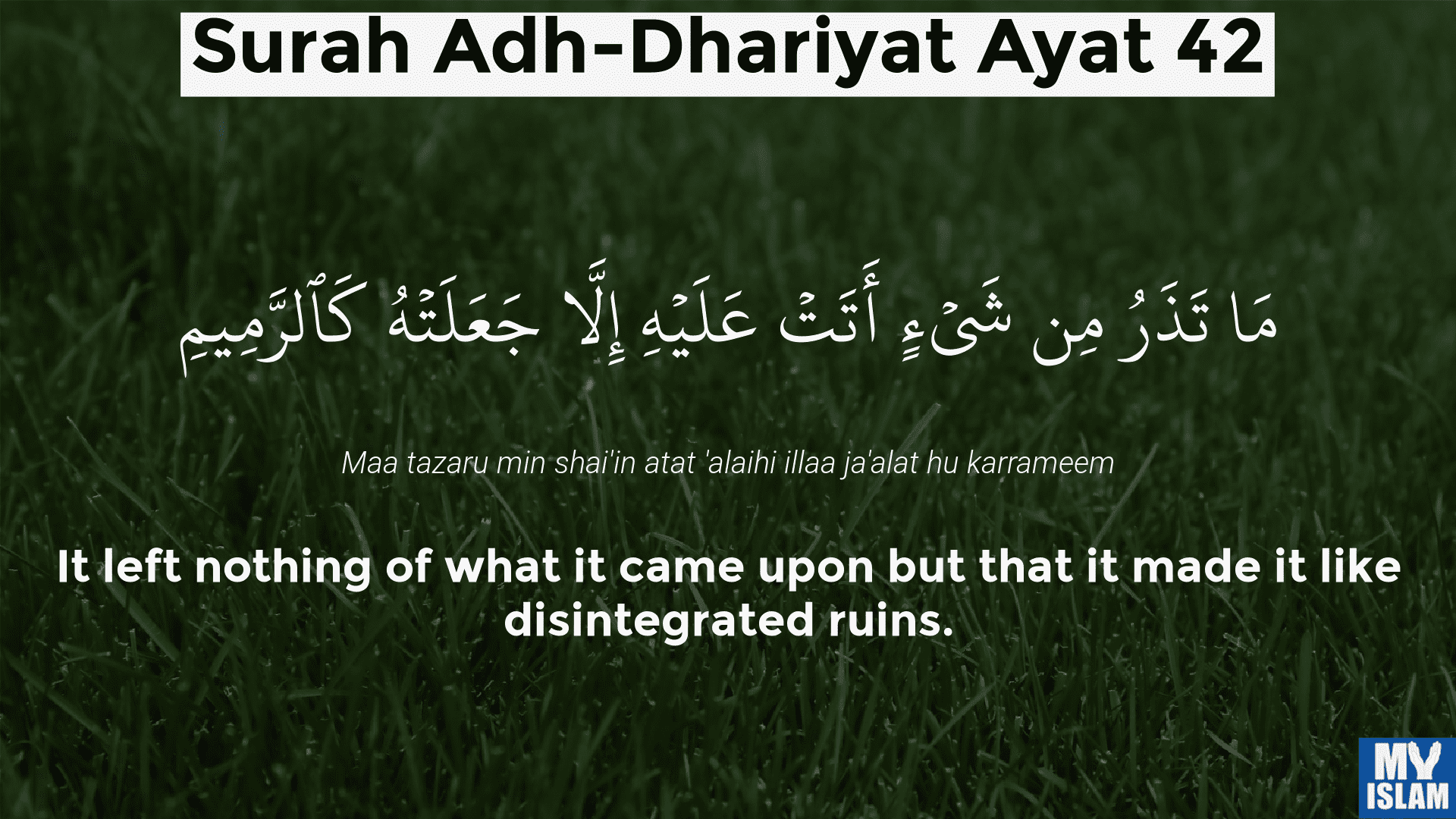Surah Dhariyat Ayat 38 in Arabic Text
English Translation
Here you can read various translations of verse 38
And in Moses [was a sign], when We sent him to Pharaoh with clear authority.
And in Moses (was another Sign): Behold, We sent him to Pharaoh, with authority manifest.
There is also a Sign for you in the story of Moses when We sent him with a clear authority to Pharaoh.
And in Musa (Moses) (too, there is a sign). When We sent him to Fir’aun (Pharaoh) with a manifest authority.
And in Moses (too, there is a portent) when We sent him unto Pharaoh with clear warrant,
And (also there is a sign) in Mûsa (Moses) as We sent him to Firaawn (pharaoh) with an evident, all- binding authority.
There is another sign in Moses: We sent him to Pharaoh with clear authority.
موسیٰ (علیہ السلام کے قصے) میں (بھی ہماری طرف سے تنبیہ ہے) کہ ہم نے اسے فرعون کی طرف کھلی دلیل دے کر بھیجا
Quran 51 Verse 38 Explanation
For those looking for commentary to help with the understanding of Surah Dhariyat ayat 38, we’ve provided two Tafseer works below. The first is the tafseer of Abul Ala Maududi, the second is of Ibn Kathir.
Ala-Maududi
(51:38) There is also a Sign for you in the story of Moses when We sent him with a clear authority to Pharaoh.[36]
36. A clear authority: such miracles and clear evidences which made it absolutely manifest that he had been appointed as a Messenger by the Creator of the earth and heavens.
Ibn-Kathir
38. And in Musa, when We sent him to Fir`awn with a manifest authority. 39. But (he) turned away along with his hosts, and said: “A sorcerer or a madman.” 40. So We took him and his armies, and dumped them into the sea (Yamm), for he was blameworthy. 41. And in `Ad when We sent against them the barren wind; 42. It spared nothing that it reached, but blew it into broken spreads of rotten ruins. 43. And in Thamud, when they were told: “Enjoy yourselves for a while!” 44. But they insolently defied the command of their Lord, so the Sa`iqah overtook them while they were looking. 45. Then they were unable to rise up, nor could they help themselves. 46. (So were) the people of Nuh before them. Verily, they were a people who were rebellious.
Allah the Exalted said,
(And in Musa, when We sent him to Fir`awn with a manifest authority.) meaning, with clear proof and plain evidence,
(But he turned away along with his hosts,) meaning, in rebellion and arrogance, Fir`awn turned away from the plain truth that Musa was sent with,
(Bending his neck in pride, and leading (others) too (far) astray from the path of Allah.)(22:9 ), meaning turning away from truth in arrogance,
(and said: “A sorcerer, or a madman.”) meaning Fir`awn said to Musa, “With regards to the message that you brought me, you are either a magician or a madman.” Allah the Exalted replied,
(So We took him and his armies, and dumped them), meaning `We threw them,’
(into the Yamm), into the sea,
(for he was blameworthy.) meaning, Fir`awn was a denying sinner and a stubborn disbeliever worthy of blame. Allah the Exalted and Most Honored said,
(And in `Ad when We sent against them the barren wind) that destroys everything and produces nothing. This was said by Ad-Dahhak, Qatadah and others. Allah’s statement,
(It spared nothing that it reached,) meaning, everything that the wind could destroy,
(but blew it into broken spreads of rotten ruins.) meaning, made it just like a rotten and destroyed. Sa`id bin Al-Musayyib and others commented on:
(when We sent against them the barren wind),”Southerly winds.” However, there is a Hadith in the Sahih from Shu`bah bin Al-Hakam, from Mujahid, from Ibn `Abbas, who said that the Messenger of Allah said,
(I have been made victorious with the Saba (easterly wind), and the people of `Ad were destroyed with the Dabur (westerly wind).) Allah saying,
(And in Thamud, when they were told: “Enjoy yourselves for a while!”) is just as He said in another Ayah,
(And as for Thamud, We guided them to the path of truth, but they preferred blindness to guidance; so the Sa`iqah of disgracing torment seized them.) (41:17) Allah said here,
(And in Thamud, when they were told: “Enjoy yourselves for a while!” But they insolently defied the command of their Lord, so the Sa`iqah overtook them while they were looking.) Thamud were given a respite for three days, during which they await the torment. In the early morning of the fourth day, the torment overtook them,
(Then they were unable to rise up,) they were unable to escape and run away from it,
(nor could they help themselves.) nor could they save themselves from the torment that befell them. Allah the Exalted and Most Honored said,
((So were) the people of Nuh before them.) meaning, `We destroyed the people of Nuh before these people (Fir`awn, `Ad and Thamud).’
(Verily, they were a people who were revellious.) We mentioned these stories in details before in the Tafsir of several other Surahs.
Quick navigation links






